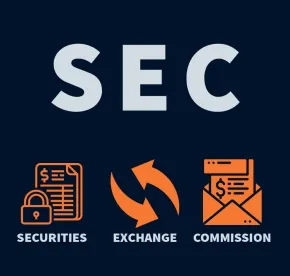Introduction and Summary
On 3 May 2023, the Securities and Exchange Commission (SEC) approved amendments to Form PF (the Amendments), the confidential reporting form required to be filed by certain SEC-registered private fund advisers. The Amendments relate to changes initially proposed in January 2022. Additional changes to Form PF, jointly proposed by the SEC and the Commodity Futures Trading Commission (CFTC), in August 2022 remain under consideration.
The Amendments significantly expand the scope of Form PF’s existing reporting obligations. As adopted, the Amendments to Form PF require:
Current Reporting Requirements for Large Hedge Fund Advisers
In addition to their existing quarterly filing obligations, advisers with at least US$1.5 billion in assets under management attributable to hedge funds must report certain events with respect to qualifying hedge funds (as defined below)—such as extraordinary investment losses, significant margin and default events, and large withdrawal and redemption requests—to the SEC as soon as practicable, but no later than 72 hours, after they occur.
Quarterly Reporting for Private Equity Fund Advisers
Within 60 days of the end of each fiscal quarter, each private equity fund adviser must file a report detailing: (a) completion of an adviser-led secondary transaction (in which the adviser offered investors the choice to sell or exchange their interests in a private fund); or (b) investor election to remove a fund’s general partner or to terminate a fund’s investment period during the preceding quarter.
Additional Reporting for Large Private Equity Advisers
Advisers with US$2 billion or more of private equity fund assets under management must disclose a range of new information in their annual updates to Form PF, including: (a) information about the implementation of general partner and certain significant limited partner clawbacks; (b) details about a fund’s investment strategies; (c) additional information about fund-level borrowings, including the average amount borrowed over the reporting period; (d) more granular information about the nature of reported events of default; (e) additional identifying information about institutions providing bridge financing; and (f) information about a fund’s greatest country exposures.
The Amendments come a decade after Form PF was first adopted in the wake of the 2008 financial crisis and reflect a further effort by the SEC under Chairman Gary Gensler to increase oversight and regulation of the private fund industry.
-
The Amendments are emblematic of the shift in how Form PF will likely be used by the SEC and the Financial Stability Oversight Council (FSOC). By requiring that current reports be filed as soon as practicable, but not later than 72 hours after the occurrence of the reporting event, large hedge fund advisers may potentially have to file reports on an ongoing basis, which represents a meaningful increase in compliance burden as compared to the quarterly reporting requirements currently applicable to such advisers.
-
In addition to requiring revisions to Form PF policies and procedures for many large hedge fund advisers and private equity fund advisers, the Amendments result in additional costs related to the new monitoring obligations, and likely increase SEC examinations of private funds (and the likelihood of enforcement actions).
Current Reporting Requirements for Large Hedge Fund Advisers
The Amendments require large hedge fund advisers to file current reports upon the occurrence of certain trigger events (described in further detail below) at a qualifying hedge fund (defined as any hedge fund that has a net asset value (individually or in combination with any feeder funds, parallel funds, and/or dependent parallel managed accounts) of at least US$500 million) that they advise in a new Section 5 of Form PF. The Amendments eliminate the proposed unencumbered cash current report, while extending the reporting period from one business day, as initially proposed, to as soon as practicable, but no later than 72 hours.
When filing current reports pursuant to new Section 5, a large hedge fund adviser will have the option to add an explanatory note with a narrative response if it believes that additional information would be helpful to understanding the circumstances surrounding the current report. SEC and FSOC will use the explanatory notes to evaluate the current reports.
Large hedge fund advisers will file current reports in a new Section 5 of Form PF through the same non-public filing system used to file the rest of Form PF, the Private Fund Reporting Depository (PFRD). Advisers will need to pay to the operator of PFRD fees that have been approved by the SEC.
Form PF, as amended, will require current reporting of the following events at a qualifying hedge fund:
A. Extraordinary Investment Losses
Large hedge fund advisers, whose advised qualifying hedge funds experience extraordinary losses within a short period of time, must provide a current report describing the losses. A loss equal to or greater than 20% of a reporting fund aggregate calculated value over a rolling 10-business-day period will trigger reporting for extraordinary investment losses.
B. Certain Margin Events
Large hedge fund advisers filing Form PF must report significant increases in the reporting fund’s requirements for margin, collateral, or an equivalent based on a 20% threshold. The SEC states that “margin” and “collateral” generally refer to assets and cash that can be claimed by a fund counterparty, lender, or clearinghouse if needed to satisfy an obligation. The inclusion of “or an equivalent” was added to increase flexibility for unique fund circumstances. In addition, the Amendments require advisers to report a fund’s margin default or inability to meet a call for margin, collateral, or an equivalent.
C. Counterparty Default
Large hedge fund advisers are required to report a margin, collateral, or equivalent default, or failure, to make any other payment in the time and form contractually required by a counterparty. The Amendments require the adviser to report the date of the default, the dollar amount of the default, and the legal name and the Legal Entity Identifier (LEI) of the counterparty.
D. Material Changes in Prime Broker Relationships
Large hedge fund advisers are required to report only the termination or material restriction of the reporting fund’s relationship with a prime broker. The first instruction under this section requires reporting when the prime broker terminates the agreement or materially restricts its relationship with the fund, in whole or in part, in markets where that prime broker continues to be active. A material restriction generally would include a prime broker imposing substantial changes to credit limits or significant price increases, or stating that it ceases to support the fund in an important market or asset type, even if it does not terminate the relationship. The second instruction requires reporting when there is a fund termination event as well as the end of the relationship whether initiated by the prime broker or the fund.
E. Operations Events
Large hedge fund advisers are required to report when the adviser or reporting fund experience a significant disruption or degradation of the reporting fund’s critical operations. Critical operations are operations necessary for the investment, trading, valuation, reporting, and risk management of the reporting fund; or the operation of the reporting fund in accordance with Federal securities laws and regulations. The current report requires the date of the operations event and the date the operations event was discovered.
F. Certain Events Associated with Withdrawals and Redemptions
Finally, the current reporting requirements under the Amendments include reporting of large withdrawal and redemption requests, the inability to satisfy redemptions or withdrawals, and the suspensions of redemptions or withdrawals. Large hedge fund advisers must report if the relevant fund receives cumulative requests for withdrawals or redemptions exceeding 50% of the most recent net asset value. In addition, a large hedge fund adviser must report if the qualifying hedge fund is unable to pay redemption requests, or has suspended redemptions and the suspension lasts for more than five consecutive business days.
Quarterly Reporting for Private Equity Fund Advisers.
All private equity fund advisers must file reports on a quarterly basis upon the execution of: (a) an adviser-led secondary transaction; or (b) investor election to remove a fund’s general partner or to terminate a fund’s investment period or a fund. The SEC has indicated it will use the reports to assess trends in reporting events that may signal an increasing trend of conflicts of interest within the private equity industry.
As with Section 5, Section 6 of Form PF also includes an option for an adviser to add an explanatory note with a narrative response if it believes that additional information would be helpful to understanding the circumstances surrounding the current report.
Private equity advisers will file event reports on Section 6 of Form PF through PFRD and pay the operator fees. Filers under Section 5 and Section 6 will not submit any other sections of Form PF at the time either report is filed.
A. Adviser-Led Secondary Transactions
Section 6, Item B, requires all private equity fund advisers to report any adviser-led secondary transactions, with reporting on a quarterly basis within 60 days of the end of each fiscal quarter. The current report is triggered upon the completion of the adviser-led secondary transaction and should include the transaction closing date and a brief description of the transaction. An adviser-led secondary transaction is any transaction initiated by the adviser or any of its related persons that offers private fund investors the choice to:
-
Sell all or a portion of their interests in the private fund; or
-
Convert or exchange all or a portion of their interests in the private fund for interests in another vehicle advised by a private equity fund’s adviser or a related person of the adviser.
The SEC noted that an adviser may use an adviser-led secondary transaction to extend an investment beyond the contractually agreed upon term of the fund that holds it and, as such, the required reporting appears to be a way for the SEC to monitor the use of continuation funds by private equity fund advisers.
B. Investor Election to Remove General Partner or to Terminate a Fund’s Investment Period or a Fund
In addition, the Amendments require all private equity fund advisers to report when a fund’s investors have removed the adviser or an affiliate as the general partner or similar control person of a fund; elected to terminate the fund’s investment period; or elected to terminate the fund, in each case as contemplated by the fund documents. The reporting requirements are triggered when the adviser receives a notification of the investors’ election. The current report requires the effective date of the applicable removal or termination event and a description of such event.
The SEC has indicated it will use the above trigger events to assess critical circumstances that may be indicative of conflicts of interest; however, the SEC recognizes that these type of events are not likely to create urgent distress. Therefore, the SEC’s view is that quarterly reporting of such events is appropriate.
Additional Reporting for Large Private Equity Advisers.
Finally, the Amendments modify the requirements relating to reporting by large private equity fund advisers in Section 4 of Form PF. The Amendments add certain questions designed to improve FSOC’s ability to monitor systematic risk and add new questions designed to enhance the SEC’s understanding of certain private equity fund adviser practices.
Below are the notable modifications to Section 4:
Question 82 - Clawbacks
Large private equity fund advisers are now required to report information about clawbacks annually. General partner clawbacks and certain limited partner clawbacks will be reported in response to the addition of a new question. Question 82 will require reporting by large private equity fund advisers on the implementation of any general partner clawback or a limited partner clawback in excess of an aggregate amount equal to 10% of a fund’s aggregate capital commitments. A general partner clawback is defined as any obligation of the general partner, its related persons, or their respective owners or interest holders to restore or otherwise return performance-based compensation to the fund pursuant to the fund’s operating agreements. A limited partner clawback is an obligation of a fund’s investors to return all or any portion of a distribution made by the fund to satisfy a liability, obligation, or expense of the fund pursuant to the fund’s governing agreements.
Question 66 - Private Equity Fund Investment Strategies
This question was added to collect information about private equity fund investment strategies. Large private equity fund advisers will be required to choose from a list of strategies by percent of deployed capital even if the categories do not precisely match the characterization of the reporting fund’s strategies.
Question 68 - Fund-Level Borrowing
This question was added to require advisers to report additional information on any fund-level borrowing. Large private equity fund advisers are required to provide information on each borrowing or other cash financing available to the fund, the total dollar amount available, and the average amount borrowed over the reporting period.
Question 74 - Events of Default
This question has been amended to require large private equity fund advisers to provide more granular information about the nature of reported events of default. The information required includes whether it is a payment default of the private equity fund, a payment default of a controlled portfolio company (CPC), or a default relating to a failure to uphold terms under the applicable borrowing agreement.
Question 75 - Bridge Financing to Controlled Portfolio Companies
This question has been amended to require reporting on the identity of the institutions providing bridge financing to the adviser’s CPCs, and the amount of such financing, to add additional counterparty identifying information.
Question 78 - Geographic Breakdown of Investments
This question has been amended to require reporting on the geographical breakdown of investments by private equity funds, by moving away from reporting based on a static group of regions and countries and towards identifying a private equity fund’s greatest country exposures based on a percentage of net asset value.
Compliance Dates
-
The new “current” reporting requirements applicable to large hedge fund advisers and new quarterly event reporting applicable to private equity fund advisers take effect six months following publication of the final rule in the Federal Register.
-
The other amendments take effect one year following publication of the final rule in the Federal Register.
-
The compliance period is short, and will require private fund advisers, especially large hedge fund advisers, to implement and redesign monitoring protocols to capture and report on the expansive list of newly required information in Section 5 of Form PF.
Key Takeaways
The new reporting timeline demands almost real-time data about relatively commonplace events at qualifying hedge funds, which will increase the compliance burden for applicable private fund advisers and is likely to require entirely new internal reporting mechanism and procedure policies. Furthermore, the use of hours instead of days may result in difficulties when assessing deadlines. In addition, the “as soon as practicable” language may result in increased uncertainties regarding compliance.
Notably, the SEC had proposed to define “digital assets” in connection to new question 66 of the amended Section 4. The SEC’s intention was to add the new term to the Form PF glossary of terms. The proposed definition would have been a step forward in defining the cryptocurrency space. However, the SEC decided not to define digital assets in the Amendments.
The SEC invoked Title IV of the Dodd-Frank Act, which authorizes the SEC to require private fund advisers to file reports if “necessary and appropriate in the public interest and for the protection of investors, or for the assessment of systematic risk by FSOC,” in adopting the Amendments. By invoking Title IV, the SEC is opening the door to more expansive and invasive policing tactics targeting private funds. The increased likelihood of enforcement actions will result in additional costs being passed down to private fund investors. Additionally, the Adopting Release does not fully explain how the newly required information will be used to address systematic risk or to protect investors. The lack of transparency for how the information will be used and the low threshold for invoking Title IV are indicative of more related rulemaking to come which may greatly impact and burden the private fund industry.






 />i
/>i

